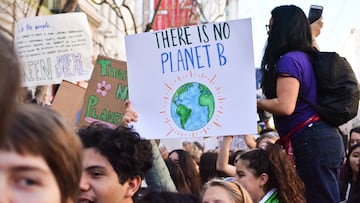The tax that Piketty proposes to the rich to tackle climate change
The economist proposes imposing a tax on the 65,130 people with assets of more than $100 million to help those who have less to adapt to global warming.

Climate change refers to long-term changes in temperatures and weather patterns. Since the 19th century, human activities have been the main driver of climate change, mainly due to the burning of fossil fuels such as coal, oil and gas. At present, this is an issue of inequality.
And it is for many reasons. Mainly, in relation to those responsible and to the victims of a crisis that directly entails an average increase in temperatures, in addition to a series of extreme meteorological phenomena, such as those that have been experienced in recent months with the temperatures swings registered in the height of the winter season or the tremendous heat waves during the summer.
Proposal to create a climate tax
The Environmental Protection Agency lists some of the key indicators of the changing weather and climate, for example, that the advance of the climate crisis will create increasingly warmer winters, with more days with higher temperatures than normal for the season and with minimum temperatures that are far from the typical values for this season.
Faced with this situation, a group of researchers from the World Inequality Laboratory, a project led by the economists Lucas Chancel and Tomas Piketty, have launched the proposal to create an international climate rate based on the highest fortunes of the planet. This has generated a great deal of controversy on social networks.
We are releasing our Climate Inequality Report today. It’s a synthesis of hundreds of research papers on the « triple climate inequality crisis ». It comes up with novel solutions to close the climate finance gap in the Global South. Have a look!👇🏼 🌍 https://t.co/c6b2Pu6Jav pic.twitter.com/urW4vqd5lV
— Lucas Chancel (@lucas_chancel@mas.to) (@lucas_chancel) January 31, 2023
What would be the collection if this rate were imposed?
In a world where the average global temperature has already risen two degrees Fahrenheit in the last century, and where thermometers could rise nearly three degrees more in just a few decades, these economists propose that a tax be imposed on the 65,130 people with assets of more than $100 million dollars to help those who have less to adapt to global warming and thus protect themselves against this crisis.
This must be between 1.5% and 3% of their fortune. If this tax is imposed, the sum generated would be 295 billion dollars each year, according to the Climate Inequality Report 2023. In addition to Chancel, Philipp Bothe and Tancrède Voituriez signed on. All of them are aware that “it is unlikely that a global agreement will be reached for a tax on extreme wealth to finance adaptation and mitigation of climate change in the near future”, in statements collected by El País.
Estimates of how much funding is needed for climate change adaptation
According to estimates, financing flows for climate change adaptation to developing countries are close to 29 billion dollars, a figure well below the real needs in this field, which amount to 200 billion. In this regard, at the last climate summit it was agreed to create a compensation fund for the poorest countries, although the way in which this instrument is funded and to whom it should be directed has not yet been defined.
Related stories
In turn, the UN Secretary General, António Guterres, has proposed taxing the extraordinary profits of energy companies, the sector that is the main emitter of greenhouse gases. Therefore, this group of economists has gone further in this sense with this proposal for the establishment of the climate tax.
New on https://t.co/sInc4Tyllz
— Thomas Piketty (@PikettyLeMonde) January 31, 2023
Climate Inequality Report 2023. Fair Taxes for a Sustainable Future in the Global South
A critical blueprint for the future by L. Chancel, P. Bothe & T. Voituriezhttps://t.co/OMAfMdt0bw https://t.co/GUm3ypWyyx pic.twitter.com/YfS0eS5ORa
What does the proposal include?
The proposal contemplates long-term development, that is, for those whose net assets are between 100 million and 1 billion dollars (62,380 people) the rate would be 1.5%; for those with assets of between 1 and 10 billion (2,584 individuals) the tax would be 2%; for fortunes between 10 and 100 billion (155 adults) the rate would be 2.5%; and for the 11 people who have more than 100 billion it would be 3%.


